Constructivism is a learning theory that emphasizes the active role of the learner in constructing their understanding and knowledge. In the course “Managing Happiness,” the facilitator uses the constructivist approach to involve learners in reflecting on their experiences, sharing personal insights, and collaboratively exploring strategies for cultivating happiness. The course incorporates different activities that stimulate voluntary muscle movements involved in smiling. For instance, imagine holding a pencil or pen in your mouth for 15 seconds. The muscle groups involved in this activity are the same ones involved in smiling, and by simulating a smile, you can change your mood and feel happier. The course content encourages self-directed learning and personal meaning-making around the concept of happiness.
Connectivism is a learning theory focusing on the idea that knowledge and learning are distributed across people and technology networks. In “Managing Happiness,” the facilitator uses the connectivist approach to leverage social networks, online resources, and collaborative tools to share diverse perspectives on happiness. The course content includes watching YouTube videos and answering multiple-choice questions related to the content. Additionally, regular online surveys are conducted to gather students’ thoughts on the meaning of happiness and the benefits of being grateful. All the surveys and answers help students build their unique happiness portfolio. The course encourages participants to connect with others, share success stories, and learn from various experiences to enhance their understanding of happiness through reflections on others’ stories.

